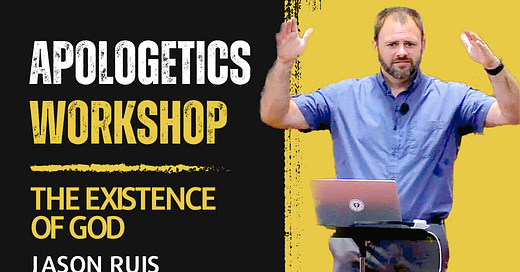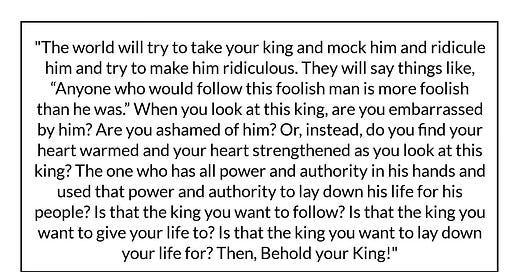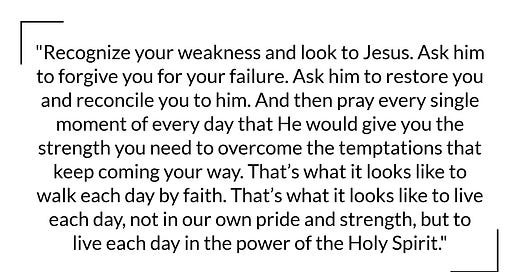
Our God Helped Us
[Read Psalm 118:8-13]
As you’ve been getting to know me more, most of you are probably realizing that I have two competing tendencies in my life. On the one hand, I’m a perpetual overcommitter. There are so many things I want to be doing—and need to be done. Yet, on the other hand, I have these perfectionistic tendencies. I’m not fine with doing anything partially. I want to do it well. These tendencies end up fighting with each other on a regular basis.
One night, about ten years ago, this struggle pressed upon me heavily. I couldn’t sleep. My mind was racing. I got out of bed and paced around the house. As I paced around the house, my mind kept racing—reminding me of all the failures in my life. At the time I was running a full-time business, I was doing ministry full-time, I was going to school full-time, and I was trying to be a husband and father full-time (yeah, that’s a lot of full-times)…and I felt like I was failing at all of them. Eventually, I became so frustrated that I pounded my fists on the table and screamed, “I can’t do this anymore!” And in that moment, a thought drifted across my mind—I think it was from the Lord—saying, “It’s about time.” Then, there was a tremendous peace that swept over me.
You see, with that short statement, the Lord cut me to the heart. He rebuked me for trying to do it all in my own strength, relying on myself and my strength and my wisdom. That’s why I was so frustrated. That’s why I was so anxious. That’s why I thought I had to be “perfect” in every one of these areas. It was all about me, me, me. So, the Lord stirred up my soul that night in order to break me—in a good way—to remind me that it’s never been about me and my strength. When I try to rely on myself and my own strength, I will break and fall.
These are the moments that reveal where we place our trust. Moment’s like the Psalmist describes in this passage. You can tell he is beginning to be overwhelmed because he keeps repeating the same phrase over and over again, and each time he repeats it, it is amplified: “All nations surrounded me…They surrounded me, surrounded me on every side…They surrounded me like bees; they went out like a fire among thorns…” (Psalm 118:10–12, ESV). Surrounded. Surrounded. Surrounded. Surrounded like bees.
When I read that line about bees, I was reminded of an adventure we took with our young children. I’m not sure how many of you have ever heard of geocaching, but it’s pretty fun. People hide containers in the woods, give a general GPS coordinate, then people try to find the container. When you find it you get to take a memento from the container, and usually place a memento of your own in the container. So, we decided to take the kids geocaching, but we didn’t call it that. Rather, we told the kids we were going on a treasure hunt. So, the excitement level was high. Rachel put Olivia on her shoulders, and I took Erin by the hand, as we began our treasure hunt. We hadn’t been walking for more than five minutes when Olivia screamed, and Rachel took off sprinting through the trees with Olivia bouncing away on her shoulders. Before I understood what happened, I got stung by a bee, then another one, then Erin got stung by a bee, and then we took off sprinting through the trees. They had stepped on a ground bee hive and they attacked us with fury. And, when bees decide to attack, when they swarm around you, you have no choice but to run as fast as you can in the other direction.
That’s what the Psalmist was experiencing. Everywhere he looked he saw enemies. They surrounded him. They were swarming around him like bees. Everything in him wanted to turn and run, but he couldn’t because whenever he turned, there were more enemies. It was a hopeless situation.
Sometimes we have a hard time relating to these Psalms because we don’t often think we have enemies. I mean, when was the last time you had an enemy that was coming after you? I’m only talking about one—let alone being surrounded by enemies. So, we have a hard time relating.
Yet, the Bible also uses the word “enemy” to describe things other than people who are attacking us. The Bible describes death as an enemy. An enemy is anyone or anything that is attacking us. Fear can be an enemy. Anxiety can be an enemy. Trials and difficulties can be enemies. Our insecurities can be enemies. When we begin to understand enemies in this way, we can more easily relate to the Psalm.
I think we’ve all come to points in our lives when we’ve felt surrounded by these enemies. In front of us we see a bill that needs to be paid, but don’t know where the money is to pay it. We look to our left and see a relationship that is broken and we don’t know how to fix it. We turn again, only to find that our car has broken down and we have no idea how we’ll be able to pay to fix it. So, we turn again, hoping to find a way out of this mess—an escape—but all we find is another trial. We feel surrounded. We feel like bees are swarming around us, wounding us. We want to run away. But whenever we turn to run, all we see is another trial standing in our way—blocking our retreat. We’re trapped.
Where do you turn in those moments? For most of us, fight or flight kicks in. Some turn into fighters. They tell themselves, “I’m strong enough” and start flailing away at their problems, trying to wipe them out in their own strength. Eventually collapsing on the ground, exhausted, recognizing they’ve hardly put a dent in the problem. Eventually pounding their fists on a table screaming, “I can’t do this!”
Some try to run away. There are many different ways to “run away” when you can’t run anywhere. Some curl up into a ball and stay there, hoping the enemies will turn away. Others turn to their phones or to a movie, trying to distract themselves from the enemies—if they ignore them long enough, maybe they’ll go away. Others turn to a bottle or some other form of drug—if they can’t physically escape the problem, they will force their mind to escape. Others escape by going shopping—another distraction. Yet, none of these are truly an escape. And, to be honest, every attempt to “escape” adds another enemy to those trying to attack you—it only makes things worse.
The Psalmist adds two more to the list. He begins by saying, “…[Don’t] trust in man.” (Psalm 118:8, ESV). At one level, we completely agree with this statement. However, in practice I don’t think we do. Where do you turn when surrounded by enemies? For many of us, we turn to someone else to help us. We recognize we’re not strong enough, so we enroll someone else to help—to increase our strength. Now, this isn’t necessarily wrong. Actually, we’re called to carry each other’s burdens. However, it becomes a problem when we ONLY trust in other people—when we ONLY turn to men in times of trouble. Why is this a problem? They are finite, sinful, weak creatures who are surrounded by their own enemies. They will fail you. They will let you down. We cannot ultimately put our trust in other people.
The Psalmist also tells us: “…[Don’t] trust in princes.” (Psalm 118:9, ESV). We could contemporize that by saying, “Don’t put your trust in the government.” Again, many will completely agree with this statement, yet in practice, many people are completely putting their trust in the government to save them, to protect them, to provide for them. Yet, this is the same problem as trusting in men…because the government is full of finite, sinful, weak creatures who are surrounded by their own enemies. They will also fail you. They will also let you down. That’s why you can’t ultimately put your trust there.
This is why the Psalmist says, “It is better to take refuge in the LORD than to trust in man. It is better to take refuge in the LORD than to trust in princes.” (Psalm 118:8–9, ESV). Rather than putting our trust in fallen, sinful, weak men or in a fallen, sinful, weak government, we are told to run to the Lord and take refuge in him. That’s where we need to turn when surrounded by enemies. We need to take refuge in the Lord.
I picture a puny child on the playground, bullies slowly moving in on him from every side. What does he do? Does he run straight at the bullies, trying to fight them in his own strength? No, he knows that wouldn’t work out well. Does he simply try to run away? No, that won’t work out well either—he’s surrounded and the bullies are faster than him. So, what does he do? He runs to that one kid in his class—the boy who hit puberty before everyone else, the one who is a foot taller than everyone else, the one who started to develop some biceps. He runs to that boy, hides behind him, and squeaks out a “Help!” He finds refuge in that boy. In the same way, when we are surrounded by enemies—bullies coming from every side—we must not try to fight them in our own strength, or try to run away. We must run to our God and find refuge in him. We must cling to him and squeak out our own “Help me!” because he alone is worthy of our trust.
Yet, here’s the powerful thing we notice in this passage. Typically, the world tells us that we have two options when faced with difficulty—it’s either fight or flight. Yet, this passage tells us that it’s not two separate options. We need to do both in the right way. We begin by fleeing—running to God for help—but then we turn and fight our enemies in the strength that God supplies. That’s why the Psalmist also repeatedly says, “…in the name of the LORD I cut them off!” (Psalm 118:10, ESV). You could also translate this to say, “In the name of the Lord I destroyed them—cut them into pieces.” It’s not fight or flight. It begins with flight, then turns into fight.
Someone could easily misunderstand this as being full of pride, ego, and bravado. Yet, he isn’t bragging about himself or his ability. He isn’t bragging about destroying his enemies in his own strength. He qualifies it by saying, “In the name of the Lord…” Later he clarifies what he means by saying, “I was pushed hard, so that I was falling, but the LORD helped me.” (Psalm 118:13, ESV). He doesn’t downplay the difficulty he encountered. He was pushed hard. He thought he was going to fall and possibly never get back up again. But it didn’t happen. Why? Because he was strong enough? Because he was fast enough to run away? No. Because the Lord helped him. That’s why he was able to destroy his enemies in the name of the Lord. The Lord was right alongside him, giving him strength, fighting for him in the battle.
To connect this with last week’s message, He knew God was good and God was with him and God was helping him. That stirred a fearless confidence in him to look his enemies in the face and defeat them in the strength that God supplies. This wasn’t about showing his own strength, but it was about admitting his weakness and trusting in his God. When weak people trust in their God, God’s power is made perfect in their weakness, they look their enemies in the face, then destroy them. They destroy their fears, their anxieties, their insecurities, and the trials facing them are destroyed as they slowly shrink away in their importance. This all happens by faith.
Where do you turn when surrounded by enemies? Turn to your God in faith.
In this season of Advent, we’re also reminded of this truth. Remember our Advent reading from earlier in the service. This is what Zechariah said about Jesus’ birth: “Blessed be the Lord God of Israel, for he has visited and redeemed his people and has raised up a horn of salvation for us in the house of his servant David, as he spoke by the mouth of his holy prophets from of old, that we should be saved from our enemies and from the hand of all who hate us; to show the mercy promised to our fathers and to remember his holy covenant, the oath that he swore to our father Abraham, to grant us that we, being delivered from the hand of our enemies, might serve him without fear, in holiness and righteousness before him all our days.” (Luke 1:68–75, ESV). Jesus entered into the world, was born in a manger, to save us from our enemies and redeem us. He was born and lived and died and rose again so that all who put their trust in Him—not in other people or in the government—would be saved from their ultimate enemy—sin and death.
But there’s more. We’re told he saved us from our enemies so that we would “…serve him without fear, in holiness and righteousness before him all our days.” (Luke 1:75, ESV). Don’t miss that line. He saved us so that we would walk in holiness and righteousness all the days of our lives. But he also saved us from our enemies so that we would serve him without fear. That we would live in this world without fear all of our days.
Advent is a reminder that our Savior entered this world with one great purpose in mind—to conquer our greatest enemy—and he was successful. He conquered sin and death. Why would we be afraid of anything else? And when we’re surrounded by enemies, we must run to him, grab hold of him, trust in him, then turn around and face our enemies head on. What can they do to us? We’ve got a Savior at our side who conquered sin and death!









